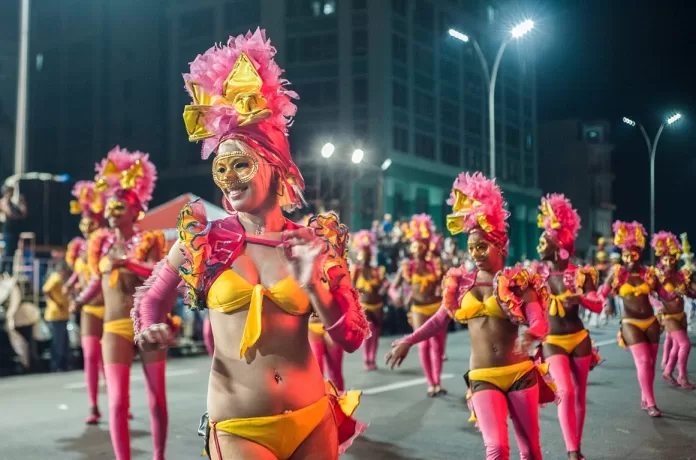Festivals are a vital part of Nigerian culture, serving as a vibrant expression of the country’s rich traditions and diverse heritage. They act as a powerful glue that binds communities together, reinforcing shared identities and promoting cultural continuity. In Nigeria, these celebrations provide a much-needed break from everyday life, allowing people to come together in joy and solidarity. From colorful parades to traditional rituals, festivals are a fantastic way to experience the heart and soul of Nigeria.
Throughout the year, Nigeria is alive with a variety of festivals that commemorate historical events, seasonal changes, and cultural practices. Each festival offers a unique glimpse into the customs and beliefs of different ethnic groups, making them an integral part of the country’s cultural landscape. For anyone eager to learn more about Nigerian society, attending these festivals is an enriching experience filled with excitement, music, dance, and culinary delights.
1. Eyo Festival
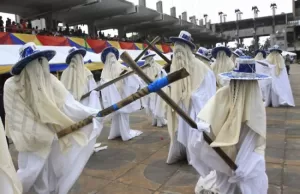
One of the most iconic festivals in Nigeria is the Eyo Festival, celebrated predominantly by the Yoruba people in Lagos. This festival, also known as the “Adamu Orisha Play,” features a spectacular procession of masquerades clad in white robes, parading through the streets of Lagos Island. Traditionally, the festival is held to honor deceased kings and chiefs or to welcome a new Oba (king) to the throne.
The Eyo Festival has garnered popularity beyond the Yoruba community, attracting tourists and other ethnic groups. It is a day filled with cultural performances, traditional music, and vibrant displays of artistry. The festival is steeped in history, with origins linked to the secret societies of Lagos. Witnessing this event is a once-in-a-lifetime opportunity for anyone interested in Nigeria’s rich cultural heritage.
2. New Yam Festival
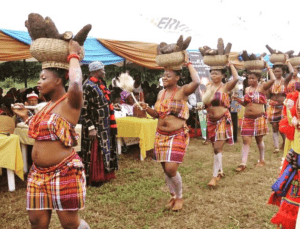
The New Yam Festival is another major cultural celebration in Nigeria, particularly among the Igbo people in the eastern part of the country. Taking place at the end of the rainy season, usually in early August, this festival marks the conclusion of the harvest period and celebrates the new yam crop.
During this time, the community engages in various activities, including traditional dances, masquerade displays, and rituals performed by the king or community leaders. Yam is the centerpiece of the celebration, symbolizing prosperity and abundance. The festival not only showcases the rich cultural heritage of the Igbo but also fosters community bonding and gratitude for nature’s bounty.
3. Ojude Oba Festival
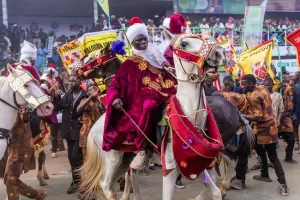
Celebrated in Ijebu, the Ojude Oba Festival is a grand event that honors the reigning monarch and showcases the cultural values of the community. This festival has its roots in the late 19th century when the king allowed foreign religions to flourish alongside traditional beliefs.
During the festival, attendees dress in colorful traditional attire, and the atmosphere is filled with music, dance, and displays of cultural heritage. The event promotes unity and appreciation for the community’s customs, making it a significant celebration for the people of Ijebu.
4. Calabar Carnival
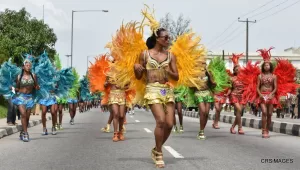
Known as “Africa’s biggest street party,” the Calabar Carnival is an eagerly anticipated event that takes place annually in December. Established by the former Governor of Cross River State, Donald Duke, the carnival is a colorful celebration of Christmas, showcasing the rich artistry of African culture.
The Calabar Carnival features lively street parades, dance competitions, and a variety of cultural performances. With its dazzling costumes and vibrant energy, it transforms the city of Calabar into a hub of festivities, attracting both locals and tourists. For anyone visiting Nigeria, the Calabar Carnival offers an unforgettable experience filled with music, dance, and cultural expression.
READ ALSO: How to Start an Online Store for International Sales from Nigeria
5. Argungu Fishing Festival
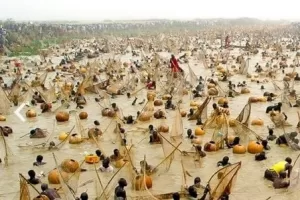
The Argungu Fishing Festival, held in Kebbi State, is a four-day event that celebrates fishing traditions and cultural heritage. Dating back to the mid-1930s, this festival marks the end of conflicts between neighboring kingdoms and has since evolved into a grand cultural celebration.
Participants engage in a fishing competition, with the goal of catching the largest fish. The festival is a unique blend of tradition, sport, and community spirit, drawing visitors from all over Nigeria and beyond. The vibrant atmosphere is filled with music, dance, and delicious local cuisine, making it a must-visit event.
6. Osun Festival
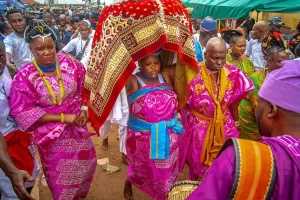
The Osun Festival, celebrated in Osogbo, is one of the most popular cultural festivals in Nigeria, dedicated to Osun, the Yoruba goddess of fertility, water, and prosperity. Taking place in August, this festival attracts pilgrims and tourists from across the country who come to pray and make offerings at the sacred Osun River.
The festival is rich with cultural activities, including rituals, dances, and traditional music. It serves as a time for community bonding and spiritual renewal, as people come together to celebrate their beliefs and heritage.
7. Lagos Carnival
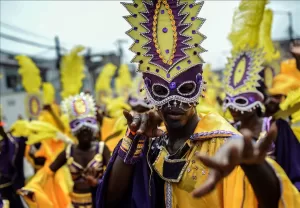
The Lagos Carnival, also known as the Caretta Carnival, is a vibrant celebration that forms part of the Lagos Black Heritage Festival. This event marks the return of slaves from Brazil and serves as a reminder of the rich cultural exchanges that have shaped Nigerian society.
Participants engage in colorful displays of traditional costumes, music, and dance, making it a lively event filled with entertainment. The carnival fosters a sense of community and pride in Nigerian heritage, attracting both local and international visitors.
8. Egungun Festival
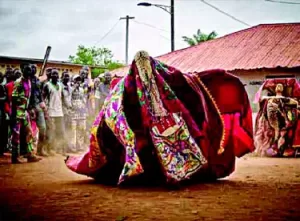
The Egungun Festival is an important cultural celebration among the Yoruba people, commemorating the memory of deceased ancestors. Celebrated in various southwestern states, the festival features elaborate masquerades and rituals that honor important figures in the community.
Held annually from November to April, the festival showcases traditional music, dance, and cultural performances, creating a rich tapestry of Yoruba heritage. It serves as a reminder of the importance of ancestry and cultural continuity.
Conclusion
Nigeria’s festivals are a testament to the country’s rich cultural diversity and heritage. Each celebration offers a unique glimpse into the traditions, beliefs, and values of various ethnic groups, making them essential for anyone looking to understand the Nigerian way of life. From the colorful parades of the Calabar Carnival to the spiritual rituals of the Osun Festival, these events create a vibrant tapestry of culture that is both inviting and captivating.
For travelers and locals alike, attending these festivals provides an opportunity to connect with the heart of Nigeria, fostering a deeper appreciation for its people, traditions, and communal spirit. Whether you’re looking to immerse yourself in cultural experiences or simply enjoy the lively atmosphere, Nigeria’s festivals promise unforgettable moments filled with joy, unity, and celebration.

